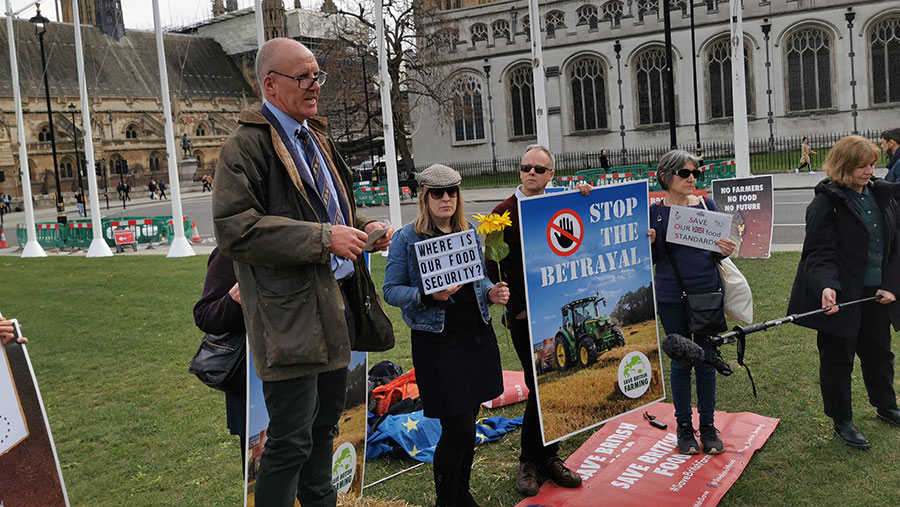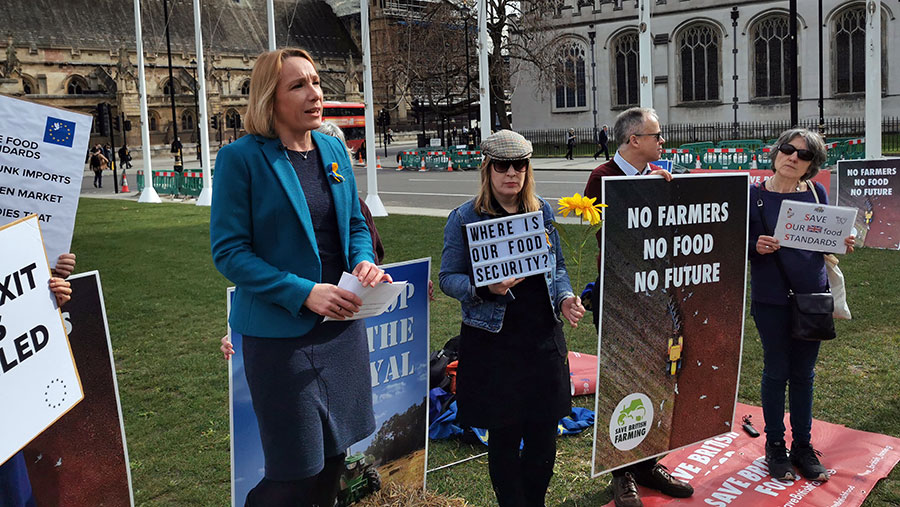‘Government policies will devastate family farms’ rally told
 Andrew Brown © MAG/Philip Case
Andrew Brown © MAG/Philip Case A Rutland farmer has described the UK government’s policy plans for agriculture as “economic suicide for farming”, warning they will force thousands of small-scale family farms off the land.
Andrew Brown, an arable farming tenant from Uppingham, delivered his damning verdict of the government’s agricultural policy during a rally in London hosted by farm lobby Save British Food on Tuesday (15 March).
Speaking in Parliament Square in the shadow of Westminster, Mr Brown said British farmers cannot compete with cheap food imports due to their high costs and high welfare and environmental standards.
See also: Farm lobby urges support for trade agreements bill
Mr Brown said Brexit, Covid and the Ukraine war had created a “perfect storm” for farmers. Although wheat futures had reached record highs of £300/t, a bag of fertiliser was now costing between £900-£1,000.
He told how he was being forced to enter an environmental scheme which involved taking half his land out of production because the government was removing direct support payments.
And he warned the government that it would “shoot itself in the foot and the head” if it intended to make up the loss of production on his farm and others by importing foods from around the world grown using products banned in the UK that are dangerous to human health and the environment.
“I can get a tonne of wheat from my farm to Liverpool for £9 a tonne and that is the same price that you can get a tonne of wheat from Canada to Liverpool on a massive boat,” he said.
Self-sufficiency down
Mr Brown said free trade deals struck by the UK government with Australia and New Zealand would be devastating for British agriculture.
“The lamb quota that is involved with the Australian deal allows 25,000t of lamb in tariff-free. That equates to about 1.6m lambs,” he said. “In 10 years, that’s going to go up to about 75,000t tariff-free. That’s 5m lambs – and all those food miles that go along with it.”
Mr Brown said the UK’s food self-sufficiency was now only around 58%, compared with around 80% 20 years ago.
He predicted that current government policy will result in 40,000 fewer farmers in this country in the next five-to-10 years – and most of these would be smaller family farms like his own.
The government’s new Environmental Land Management (ELM) programme will not be on stream until 2024 and direct support will be phased out by 2027.
“The land will still get farmed, but it will be done by big industrial agricultural companies. They will have their own central suppliers and will not be using the small agricultural suppliers and the agricultural engineers like I currently use,” said Mr Brown.

LibDem MP Helen Morgan © MAG/Philip Case
MPs’ concerns
During the event, several opposition MPs echoed similar concerns about the future direction of the government’s agricultural policy.
Liberal Democrats rural affairs spokesman Tim Farron said ELMs was a good policy in theory, but he was “not in favour of phasing out enormous chunks of farm income, starting last December, without the availability of anything to replace it”.
And North Shropshire LibDem MP Helen Morgan said farmers in her constituency were facing an “unprecedented crisis”.
“Their incomes have fallen to the lowest point in 10 years and that’s before their basic payments started to be phased out,” she said. “Their input costs are going through the roof and that’s only going to get worse due to the war in Ukraine.”
Shadow Defra secretary and Labour MP for Cambridge Daniel Zeichner accused the government of “trying to do down the family farms”.
“It’s the only conclusion you can come to when you look at the mixture of the Agriculture Act and their trade deals,” he said. “They made repeated promises not to undercut British food and farming standards, but they have never put that into legislation.”
Mr Zeichner said Labour’s position was clear. “We should be making more, growing more, buying and selling more British produce – and that’s our promise to rural communities.”
Liz Webster, founder of Save British Food, said Conservative MPs were invited to the rally, but did not attend.
Contingency plans
Last week, Defra secretary George Eustice told MPs he had set up teams in January to make contingency plans for the UK’s food security.
Commons leader Mark Spencer said the government takes food security very seriously and he insisted that Defra was “across the threats we face”, adding that there was “no prospect of any food shortages at any point in the future”.
“Defra is working with the Treasury to try to make sure that that continues to be the case,” he said.
Trade agreements bill seeks final vote for MPs
A private members’ bill which is seeking to give MPs a final vote on any trade agreements negotiated by the government for food and farming will have its second reading in parliament on Friday 18 March.
The bill, tabled by Tim Farron, LibDem MP for Westmorland and Lonsdale, would also place a duty on the secretary of state to lay reports on the impact of trade deals on UK farming, the environment and animal welfare.
Mr Farron told Farmers Weekly: “The Trade and Agriculture Commission still does not have very many teeth. It can write a report, but if the government wants to ignore it, it just will.
“I want to make it not possible for the government to pass trade deals without the consent of farming communities like my own.”
